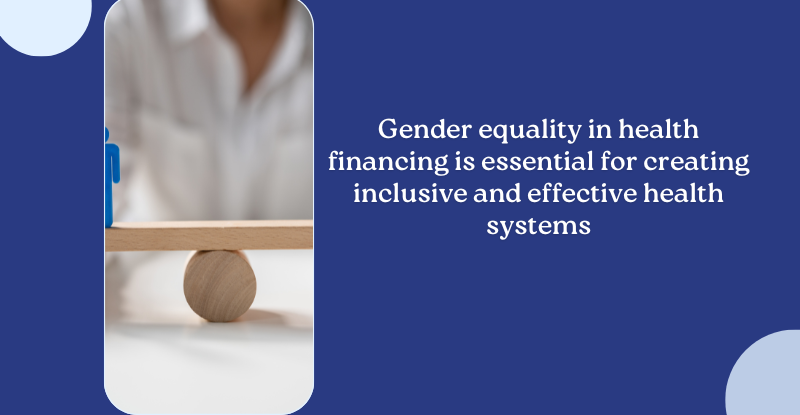By: Dr. Thenjiwe Sisimayi
The Risk of Gender Equality Setbacks in Health Financing
As donor funding for health shifts and declines, governments across Africa are under immense pressure to mobilize domestic resources and prioritize essential services (World Health Organization [WHO], 2023). While this transition is necessary for long-term sustainability, it comes with a significant risk—gender equality in health financing could be deprioritized, deepening existing inequities.
Without intentional strategies to ensure gender remains central to health financing decisions, women, girls, and marginalized communities will bear the brunt of funding cuts. Services such as maternal and reproductive health, gender-based violence (GBV) response programs, and community health initiatives—often seen as “soft” investments—risk being sidelined in favor of high-profile disease programs or infrastructure projects (UN Women, 2022). Yet, these services are not optional; they are fundamental to achieving universal health coverage (UHC) and building resilient health systems (OECD, 2021).
At Financing Alliance for Health (FAH), we recognize that navigating the changing donor landscape requires more than just securing alternative funding sources—it demands a deliberate commitment to gender-responsive health financing. Governments and Ministries of Health (MoHs) must ensure that gender integration is not an afterthought but a core pillar of their financing strategies. Below, we outline key recommendations to help governments manage this transition effectively while safeguarding gender equity in health financing.
FAH’s Recommendations to Governments and Ministries of Health:
- Strengthening High-Level Strategic Orientation and Gender-Responsive Advisory Support
- Establish a Rapid Response Task Force: Led by FAH and supported by Health Development Partners, this task force should provide real-time strategic guidance to governments, ensuring that gender considerations are embedded in donor transition planning (WHO, 2023).
- Conduct Executive Briefings & Policy Dialogues: Ministers and senior officials must be equipped with insights on how donor shifts impact gender-responsive health financing and strategies to mitigate gendered service delivery gaps (Global Financing Facility [GFF], 2023).
- Facilitate Peer Learning & Knowledge Exchange: Governments should engage with countries that have successfully integrated gender equity into sustainable health financing models, learning from their experiences and best practices (World Bank, 2022).
- Building Capacity and Providing Gender-Responsive Technical Assistance (TA)
- Implement Gender-Inclusive Public Financial Management (PFM) Strategies: TA should focus on budget formulation, execution, and accountability using Gender-Responsive Budgeting (GRB) to ensure resources are equitably allocated (Stotsky, 2020).
- Deliver Health Financing Crash Courses: Short, intensive training sessions on domestic resource mobilization, donor transition management, and health financing must include gender-sensitive investment case development (GFF, 2023).
- Conduct Gender-Sensitive Scenario Planning & Risk Mitigation: Governments must map potential funding sources and conduct fiscal space analyses that assess how shifts in funding affect women, girls, and other vulnerable groups (Chakraborty, 2021).
- Enhancing Crisis Communication & Gender-Sensitive Stakeholder Engagement
- Engage New Funders with a Gender Lens: Governments must craft investment cases that emphasize the gendered impact of funding cuts and advocate for gender-equitable health financing from alternative donors, private sector partners, and global financing institutions (OECD, 2021).
- Strengthen Political Advocacy Training for MoH Leadership: Ministers of Health must be equipped with skills to negotiate with Ministries of Finance and Parliament for increased domestic funding while advocating for gender-sensitive budgeting (UN Women, 2022).
- Develop Gender-Sensitive Community Engagement Strategies: Ensuring service continuity requires MoHs to actively communicate with affected populations, particularly women’s rights organizations and grassroots health networks (WHO, 2023).
- Adapting Policies and Programs to Protect Gender Equity in Health Financing
- Define Service Prioritization Frameworks with a Gender Focus: Governments must ensure essential services—including maternal health, family planning, and GBV response programs—remain protected even in the face of budget cuts (World Bank, 2022).
- Promote Cost-Effective Innovations that Address Gender Disparities: Digital health solutions, community-led task-shifting, and efficiency measures should be leveraged to sustain gender-responsive service delivery (GFF, 2023).
- Integrate Gender into UHC Frameworks: Donor-funded programs, such as HIV, TB, and Malaria services, must be transitioned into national UHC systems with a gender-equitable approach (Stenberg et al., 2019).
- Establishing a Gender-Responsive Transition Coordination Mechanism
- Form a Joint WHO-MoH-FAH Taskforce: A national coordination platform should be created to track progress on gender-responsive health financing and donor transition (WHO, 2023).
- Foster Multi-Sectoral Collaboration: Ministries of Health must engage key stakeholders, including Ministries of Finance, Planning, and Development Partners, in coordinated responses that align gender-sensitive health system strengthening with national economic strategies (OECD, 2021).
Conclusion: Gender-Responsive Health Financing Is Non-Negotiable
The transition away from donor dependence presents both a challenge and an opportunity. Governments have a chance to build more resilient, self-sustaining health systems, but if gender is not intentionally prioritized in this process, the progress made in health equity could be reversed. FAH stands ready to support Ministries of Health in navigating this transition while safeguarding gender equality in health financing. The future of Africa’s health systems depends on ensuring that no one—especially women and girls—is left behind.
Let’s ensure that gender remains at the heart of health financing decisions.
References
- Chakraborty, S. (2021) Health financing in Africa: A gender perspective on donor transitions. London: ODI.
- Global Financing Facility (GFF) (2023) Gender and Health Financing: A Framework for Action. Washington, DC: World Bank.
- Organisation for Economic Co-operation and Development (OECD) (2021) Gender budgeting in health: Strengthening equity in resource allocation. Paris: OECD Publishing.
- Stenberg, K., Hanssen, O., Tan-Torres Edejer, T., et al. (2019) Financing transformative health systems to achieve gender equality goals. The Lancet, 393(10190), pp. 2442-2453.
- Stotsky, J. (2020) Gender budgeting: Practical lessons from global implementation. Washington, DC: International Monetary Fund (IMF).
- UN Women (2022) The Gendered Impact of Health Financing: Ensuring Equality in Resource Distribution. New York: UN Women.
- World Bank (2022) Investing in Women’s Health: The Case for Gender-Responsive UHC Systems. Washington, DC: World Bank.
- World Health Organization (WHO) (2023) Gender and Health Financing: Addressing Inequities in Transitioning Economies. Geneva: WHO.


Leave a Reply